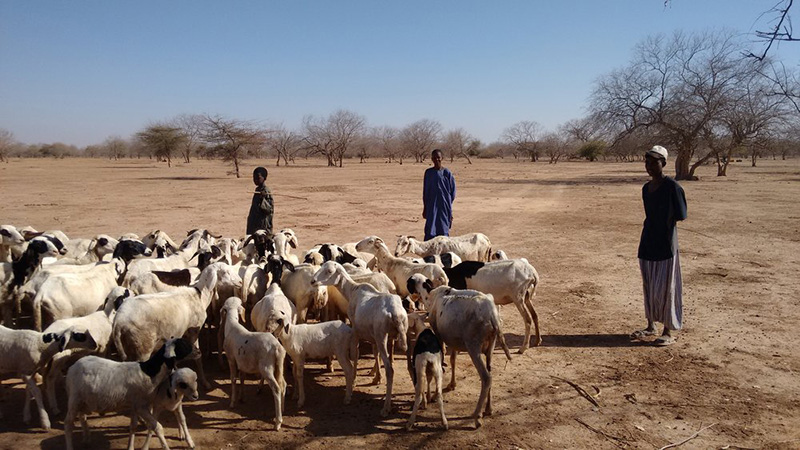RVC wins GCRF award for its research into goat plague
The Royal Veterinary College (RVC) has been awarded a GCRF Global Research Translation Award to fund its pioneering study of the viral pathogen that causes peste des petits ruminants (PPR) or ‘goat plague’.
The award will help eradicate this deadly disease by validating tests which can identify the presence of the disease in animals.
PPR is an emergent disease that affects goats and sheep across Africa and Asia, but wildlife such as antelopes have also fallen victim to the disease too in recent times. PPR was behind the mass mortality of the rare Mongolian saiga antelope in 2017 when ~85% of the population died. Animals suffer severe symptoms including fever, diarrhoea, coughing, discharge from the eyes and nose, and most affected animals die.]

A team from the RVC led by Professor Richard Kock, Dr Bryony Jones and Dr Camilla Benfield have been studying the epidemiology of the disease for the last seven years, thanks to the funding of the GCRF [Global Challenges Research Fund], which is managed by UK Research & Innovation. The research is focused on untypical hosts for the virus, given its spread into new habitats and amongst novel species, with the aim of helping to develop strategies that will efficiently eradicate the virus globally.
This new GCRF Global Research Translation Award will allow the RVC to examine a number of new tests that have been developed for PPR serology (the testing of blood for antibodies and antigens that indicated the presence of the PPR virus or recent infection). Specifically, they will use novel methods to investigate whether pseudotype tests and luminescence assays can be used as gold standards for testing for PPR and better validate test protocols ready to support global vaccination programmes. The researchers will also focus on validating that these tests work across a diverse spectrum of untypical host species. Currently, the only commercial test available is ELISA and there are question marks around false positive and negative results it has had in some species, which makes this research vital.
The University of Glasgow and the International Atomic Energy Agency (IAEA) are joining this research project as new partners. The partnership also includes the main reference laboratories of Pirbright, CIRAD, the FAO coordinated PPR Global Eradication Programme and Research Network, the Kenya Wildlife Service and Tanzania Wildlife Research Institute. A key element is establishing these tests and protocols, as well as capacity, in an African laboratory. The research will therefore be happening in Sokoine University of Agriculture, Tanzania, part of the Southern African Centre for Infectious Diseases, to support the Government veterinary services during the eradication phase of PPR in the region.
Professor Richard Kock, specialist in wildlife health and emerging diseases at the RVC, said: “PPR is a global challenge, not only of great economic concern to poorer livestock keepers across Asia and Africa but also, it kills rare and vulnerable wildlife, disturbing ecosystems. This situation justifies action, especially in the current global climate, where poverty and insecurity of human populations is leading to mass migration and conflict, further spreading diseases, creating hunger and loss of resilience. It is likely there will only be one shot at eradicating this menace affecting many species, so it is vital that the tools are in place and accurate. This contribution led by the Royal Veterinary College in partnership with, British, European and African researchers will be significant in this regard.”
Notes to Editors
For more information please contact:
- Ploy Radford (ploy.radford@plmr.co.uk) or Jasmin De Vivo (Jasmin.DeVivo@mangomarketing.com)
- Press Line: 0800 368 9520
About the RVC
- The Royal Veterinary College (RVC) is the UK's largest and longest established independent veterinary school and is a constituent College of the University of London.
- The RVC is ranked as the world’s number one veterinary school in the QS World University Rankings 2019.
- The RVC offers undergraduate, postgraduate and CPD programmes in veterinary medicine, veterinary nursing and biological sciences.
- The RVC was the first veterinary school in the world to hold full accreditation from AVMA, EAEVE, RCVS and AVBC, and currently holds full accreditation from RCVS, AVBC and AVMA and conditional from EAEVE.
- In 2017, the RVC received a Gold award from the Teaching Excellence Framework (TEF) – the highest rating a university can receive.
- A research-led institution, the RVC maintained its position as the top veterinary institution in the Research Excellence Framework (2014), with 79% of its submission being rated as world-class or internationally excellent.
- The RVC also provides animal owners and the veterinary profession with access to expert veterinary care and advice through its teaching hospitals: the Beaumont Sainsbury Animal Hospital, in central London, and the Queen Mother Hospital for Animals (Europe's largest small animal referral centre) and Equine Referral Hospital, both located at the Hertfordshire campus.

